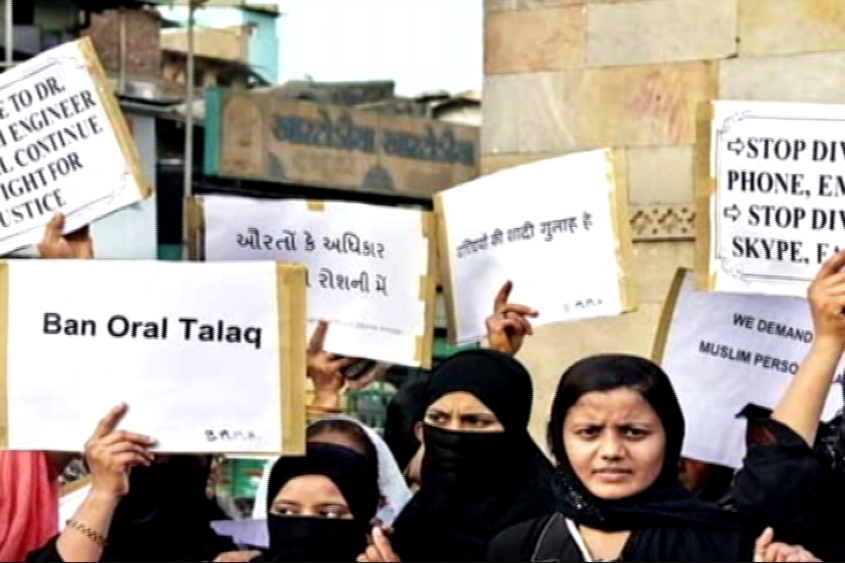Initial reactions by women activists to the Supreme Court’s verdict on instantaneous triple talaq or Talaq-e-biddat have been celebratory, but Law Minister Ravi Shankar Prasad’s statement a day later hinting that the verdict will not require a new law to be made, has left many hopefuls feeling disappointed and defeated.
Explaining her disappointment, Farah Faiz, an advocate working on the case with the Bhartiya Muslim Mahila Andolan (BMMA), said, “The SC’s verdict still means victory for us, but it is a half-victory only. The court does not allow a Muslim man to practice Talaq-e-biddat anymore, but what if he does? Under what provision of law will the court punish a man for doing something that the court sees as unconstitutional?”
Minister of Law and Justice Ravi Shankar Prasad has said, “As of now, there is no need of introducing a new law. If the government sees the need in future, it will surely be done.”
According to Prasad, there was no need for a new law as the old and existing laws in India pertaining to the same issue were sufficient to curb this practice. Other than a general advisory from the Ministry of Home Affairs, no additional direction has been issued about the implementation of the SC’s verdict on instant triple talaq.
This effectively means that if a woman still has been given instantaneous talaq and if she chooses to go to a police station, any penal action would depend on the circumstances. If she has been threatened or intimidated and physically hurt, the case can be register under Domestic Violence Act, 2005. However, if it is only instant talaq, then it will become a civil matter. Welcoming the Supreme Court verdict, Uzma Naheed, former member of the All India Muslim Personal Law Board (AIMPLB) and great granddaughter of Moulana Qasim Nanutwi, founder of Darul Uloom, Deoband, said: “The judgement is right. Though I feel that we would have been able to solve the problem ourselves without requiring the court’s intervention, now that the Supreme Court has given a verdict, we will abide by its ruling. However, we clearly need to evaluate the consequences of the judgement because there is no clarity on its implementation.” Farah Faiz said, “There is a difference in domestic violence and divorce. How can we register these two under the same law? After the SC’s verdict, a woman will only be able to file a contempt of court case and nothing more. We have to penalise the man who practices instantaneous triple talaq to be able to discourage it.”
“In the judgement, it is not clear whether this dictum is restricted to uncodified personal laws alone or to all personal laws.”
Naheed said: “We are clear about the fact that there is lack of awareness among Muslims about personal law. Now, even if the court has said that Talaq-e-biddat is unconstitutional, if the local qazis and Darul Qaza refuse to recognise the SC’s verdict, what will a woman do? The core problem was how to discourage misuse of provisions given by the Shariat. In this context, the court did not provide any clarity as to how announcing Talaq-e-biddat as unconstitutional will discourage its practice.”
“In this sense, it seems to be a half-hearted effort in the said fight to empower Muslim women, as the court did not decide any punishment for the man who pronounced instantaneous triple talaq to his wife. There wasn’t even a single aalim (scholar of Islamic law) in the court to counsel on this matter,” added Naheed. Criticising the AIMPLB, Congress leader Anees Durrani said, “The Board failed to propagate the real procedure of talaq as is very clearly mentioned in the Quran. Neither did the Board dissuaded Muslims not to follow non-Quranic methods for separation. The Board has not even prepared a draft Nikahnama which can play a major role in settlement of marital disputes.” A modern Nikahnama drafted within the ambit of Shariat that allows a Muslim woman to lay down her conditions for marriage like her choice of meher, prohibiting polygamy and Talaq-e-biddat etc., has been recognised by many Muslims as a viable solution to the problem of instantaneous triple talaq. However, lack of awareness about the rights of Muslim women as sanctioned by Quran and reluctance of scholars to highlight women’s issues, has largely kept the modern Nikahnama in cold storage.
Tarun Khaitan, associate professor and Hackney Fellow in law at Wadham College, Oxford, United Kingdom, said, “One of biggest problems with the judgement is that it provides very little clarity for future cases. Given the enormous workload of the Supreme Court, assembly of a five-judge bench is a rare thing. When such benches are constituted, the hope is that they will clarify the law on a controversial area for the High Courts, and for smaller benches of the Supreme Court. Every time a five-judge bench fails to clarify the law, it increases the future demand for larger benches which can take years.” Khaitan added, “Two judges (Justices Khehar and Nazeer) held not only that personal laws were immune from constitutional challenge, but also that they had the status of a fundamental right—a remarkable proposition that has basis in no legal precedent I know of. In the judgement, it is not clear whether this dictum is restricted to uncodified personal laws alone or to all personal laws. The judgement is also silent on the question of sex discrimination. Only two judges, Justices Nariman and Lalit, test the law against constitutional guarantees. Even they restrict their analysis only to determining whether the law was arbitrary. Since they found it was, the law was declared unconstitutional on that basis alone.”

